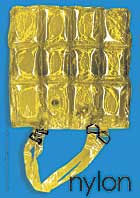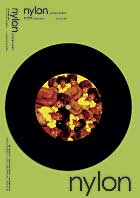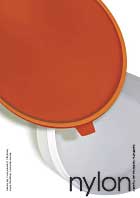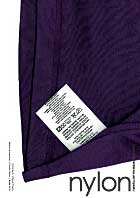
 |
|
An
interview with |
|||
 |
"nylon
as kuenstliches Material weckt Assoziationen zu konstruierter Weiblichkeit. nylon steht fuer Style. Style gehoert als Identitaetsstrategie zu unserer Alltagskultur. nylonund Laufmaschen. Die Fehler im System. nylon steht fuer Bewegung. nylon tragen/lesen (fast) alle. Von der Hausfrau bis zum Glamour-Girl." |
||
|
We
are a group of 7 women between 24 and 38 We are from different parts
of Austria and Germany, but all of us reside in Vienna. What do you do besides your zine? Most
of us have part time day jobs, some of us still go to university (but
are all already preparing their MA thesis/Diplomarbeit). Most of us
have a lively interest in music and club culture, literature, film,
politics etc. For how long have you been running your zine now? How many issues did you put out until now? Are you the only editor or is there a team? The
first issue of nylon came out in April 1999. There have been 5 Issues
so far. We are team of 7 editors, there is no editor-in-chief. |
|||
|
What made you decide to start this project? How did you come up with the idea and the name? All of us already cooperated on the board of another feminist zine, but because of some personal difficulties and since we weren't happy with the direction in which this magazine was going, we decided to start our own project which would center more on the implications of the impact of pop culture on feminism and the ways in which they interact or contradict each other.
|
 |
||
|
We
searched a long time for an adequate title and than came up with Nylon
since it seemed to denote best our affinity to artificial, short-lived
pop culture, and also the associations of artificiality and |
|||
 |
What topics are most often discussed in your zine? Feminist/queer
theory, pop music and club culture, literature, film, comics, new technologies
i.e. the internet. What do you hope to accomplish by establishing your zine? Oops,
hard one. To discuss the connections and contradictions of Feminism
and pop culture because we find that the aspect of feminism is neglected
in the almost omnipresent and ah-so-fashionable anylses of popular culture,
or is even hardly ever discussed at all (at least in German speaking
countries) - we try to raise awareness in this respect. We also want
to enrich the critical discourse on pop culture with an important facet
by doing so. Of course, we also want to further discourse feminist theory
and |
||
|
What does zine making (and reading) mean to you? What do you love about zine making? What's the most challenging aspect of making zines? Well,
it means a lot of unpaid work. But it also means getting together with
similarly minded women (and also reading about/from them) and raising
our own voice in a money-dominated mainstream press with making only
very few amends to the marketability of the "product". It
means writing about the things we care about in ways that we want, not
having to fit into any preformatted media slots, not having to care
if enough people will buy the zine if we speak our minds freely.(And
of course it's great to do something you are really passionate about
and that you believe in without thinking about money and target audiences).
The most challenging thing is probably the money and time issue - there
is simply never ever enough of both. And that - at least for some times
during production - your personal life may very well go to hell and
the tender bonds of friendship with your dear co-editors (and, mind
you, friends) are permanently on the point of tearing apart due to constant
stress. What was your first exposure to zines? How did you find out about them? What have they come to mean to you? I
think that is different for all of us - I think our editor Judy was
the first to put out a personal zine and she, rooted in the punk scene,
was exposed to zine culture from early on, I. for example, had my first
serious contact with zines when I was studying at UCSC a couple of years
ago, and for others of us zines may not have played an important part
in their decision to put out nylon at all. |
|||
|
Do you consider grrrl zines as an important part of a movement of sorts? Do you think zines can effect meaningful social and political change? Yes,
very important, but unfortunately hard to come by, especially for girls
who live far away from metropolitan areas. So the distribution may be
an obstacle to its movement character. Well, I do certainly hope that
zines can affect the way we view the feminist movement - it just tells
you that there are so many more feminist-minded women out there, which
is a powerful feeling. And Riot Grrrl happened in the wake of a "Zine
Revolution", and as controversial the reception of Riot Grrrl in
the press may be, it definitely had a huge impact on our perception
of a feminist presence and activism after the massive backlash in the
80ies. |
 |
||
|
What does the zine community mean to you? Well,
I have to admit that i fear in Austria there is not much of a community
(yet?). Could be a great thing, and of course we are all networking
in all kinds of fields, but we are all friends anyway (but this raises
the question of which came first: friendship or network?? hmm, interesting).
So yes, in theory the zine community could be a great thing, and I think
it is in the US, but here we have some more networking or development
;-) to do. What advice would you give others who want to start a zine? Hell,
I don't know. The old "Just do it" (yikes) I guess. Write
about what really interests you, don't be afraid to be personal, xerox
it and start telling your friends and potential friends about it - you'll
see that things start happening by themselves. What are some of the zines you admire? I
guess that's different for each of us again. Could
you please describe a little bit the grrrl zine community in your country?
Yes.
We're all feminists. What do you think about feminism today? Do you seeyourself as part of "Third Wave Feminism" and what does it mean to you? I guess we could be seen as Third Wavers, but I believe that we all think that the media always tries to "divide and conquer", to be able to write about a new "fad" or hype, and also, since the media are of course male dominated in a patriarchal society, to induce a split to divide the feminist movement. So we think that it's more important not to reinvent the wheel every time, to learn from the Second Wave and to try to build a bridge to today. VINA:
it might be true that "cultural" or "post-modern"
feminists have neglected economic and social restraints, but focused
too much on "symbols" and questions of identity, representation
etc (by the way, I´ve never met a woman who would call herself
a "cultural feminist" - labels, eh?). but obviously, i.e.
the question of representation can be directly linked to economic conditions
people live under. in our recent issue there´s an article about
the global fashion industry, that creates desires based on specific
images of race and gender and sells to western consumers - those fashion
items are mostly produced by women in export processing zones and sweat-shops
in asia, south europe and latin america. without referring to this very
symbolic level of desire and identity (the power of fashion labels),
there would be a lack in analyzing the economic and political power
of the fashion industry of today - and vice versa. Which role plays the Internet for you? Does it change your ideas of making zines and doing/reading zines? For
most of us the internet is an indispensable tool that we use everday
to communicate and to do research. It makes access to other zines a
lot easier and is therefore very useful - but you have to put up with
more and more commercial shit on the World Wide Web, which is a development
that has to be observed critically. Unfortunately, we haven't had time
yet to design our own website. Some of us think that this is crucial,
others reckon that other stuff regarding nylon has higher priority. Do you have any suggestions? Something you want to add? Girls, keep on getting the word out. We love to hear from you in a world that is still crowded by overzealous indie boys who always know best. VINA:
spread the f-word ;-) |
|||
|
|
|||
|
copyright
of images by NYLON 2002
|
|||